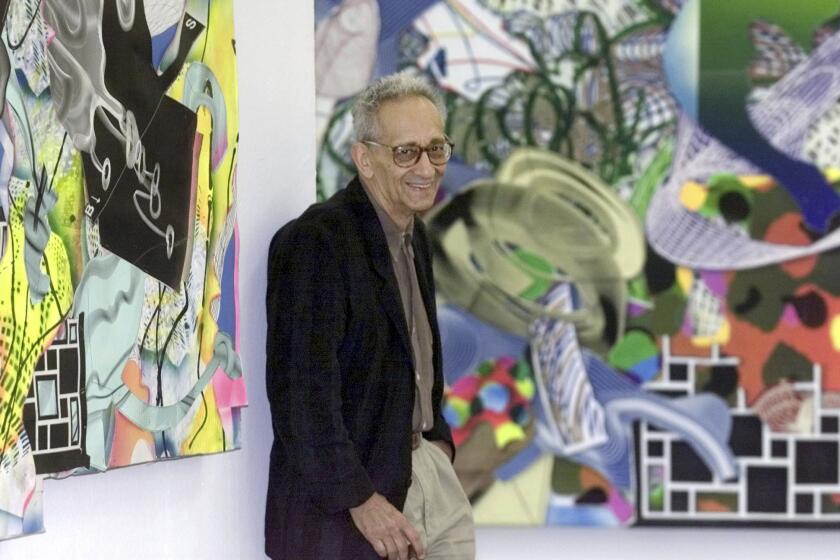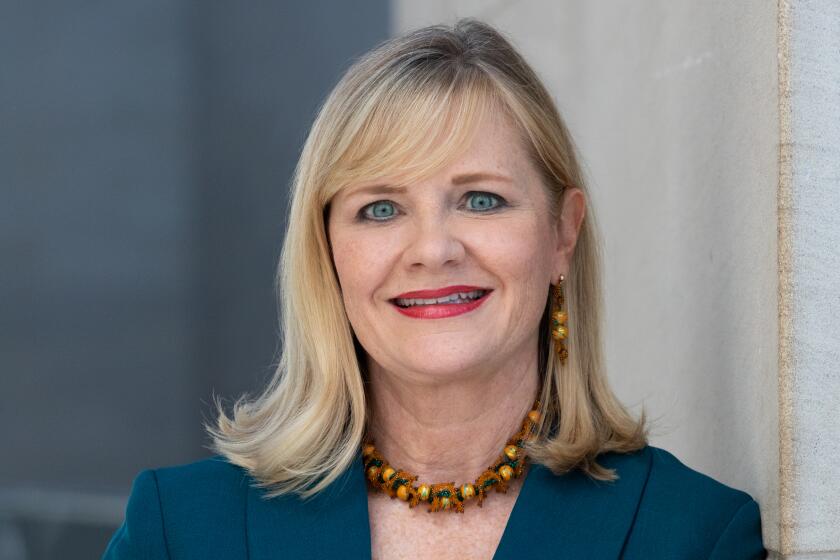Conjuring Up Immigrant Dreams
In the mind of Jose Cruz Gonzalez, comets wear roller skates, suitcases hold butterflies and men levitate to the sky after making love to a woman who cannot love them in return.
In the plays of Gonzalez, those wonders actually take place before your eyes. Well, perhaps not actually, but, then, that’s where the art of theater shows its hand.
“If you find the right collaborators,” says the soft-spoken Gonzalez, “anything is possible.”
Which is fortunate for the prominent Latino playwright and director, because his Chicano roots and rich imagination infuse his plays with magic. Witness “Marisol’s Christmas,” a sweet fable about family and border life now at the Falcon Theatre in Burbank.
Light on its feet, “Marisol’s Christmas” uses a cast of only four and simple props such as roller skates--for the comet, of course--and a beach ball to tell the story of Christmas Eve for a little Mexican girl named Marisol, who has just arrived in Los Angeles with her father. Marisol misses her mother, who hasn’t arrived yet, so her papi weaves an elaborate fairy tale to raise her spirits.
“To me, ‘Marisol’ is really about a sense of hope,” says Gonzalez, 44, a professor of theater arts and dance at Cal State Los Angeles. “It’s like any immigration story. It’s about coming and dreaming, and working for that dream.”
Gonzalez is distinguished in the world of Latino theater, having launched and served as project director of South Coast Repertory’s nationally known Hispanic Playwrights Project for 11 years. The Falcon’s selection of “Marisol” as its holiday production reflects the theater’s new campaign to diversify its audience and court Latino theatergoers with productions that reflect their culture.
“It has a real charm and simplicity that I think are in keeping with the best that the Falcon does in terms of children’s theater,” Falcon producing director Jan Breslauer says. “And it reaches out to the Latino community, which is something [Falcon founder] Garry Marshall and I thought would be a good thing to do. It’s an audience that hasn’t yet been invited to the Falcon, and ‘Marisol’s Christmas’ will bring them in, in a way that doing a work that specifically speaks to a culture can.”
The director, Mark Valdez, a longtime admirer of Gonzalez, says the play’s Latino flavor was a strong draw for him. “It’s wonderful to be working on a Latino play,” says the 30-year-old Valdez. “There aren’t that many of them out there. And it has a very wide appeal. It’s a balancing act of respecting a culture but not excluding anyone who’s not a member.”
Marisol made her debut in Gonzalez’s mind several years ago on the road from Los Angeles to San Diego, where he was directing a workshop at the Old Globe Theatre (now the Globe Theatres). During his commutes, he would frequently pass a yellow sign at a border stop near San Onofre that featured a family: A father, mother and child are running, all holding hands, in a warning against crossing the road.
“There have been over 100 people who’ve died crossing that freeway,” Gonzalez says, “so that image always struck me. My wife teaches elementary school in Santa Ana, and it’s predominantly immigrant kids. So the stories she would tell me about the children and the struggles they have to go through living in an urban landscape, how does a child grow up in that?”
The structure of Gonzalez’s nimble play also springs from Latino culture, the tradition of teatro Chicano . The grass-roots form of theater, spawned by the migrant worker movement of the ‘60s, is short on resources but long on resourcefulness, mounting simple productions with found objects and a few actors playing multiple parts. “I’ve been there thinking the way you do in poor theater,” he says. “It’s economical and you can tour it very easily. You just throw it into a truck.”
As originally written for Santa Ana’s Teatro Cucucuevez in 1994, “Marisol” called for three actors who morphed from family members into the curious creatures of papi’s fable. For the Falcon production, the fourth version of the play, which has also been staged by South Coast Rep, Gonzalez wrote in a fourth actor at the theater’s request to amp up the theatricality of the production. Gonzalez decided to add a homeless person.
“The Christmas season is a sad time for a lot of people, and I guess I just wanted to look at that side of Christmas,” he says. “They’re all part of the human race, and they share a moment together.”
The characters move fluidly between English and Spanish, so Gonzalez was careful to communicate meaning by providing context and well-placed responses in English. “Spanglish” came naturally to him because it filled his home when he was growing up in a family of migrant workers in Freedom, a tiny town in Northern California. His more recent plays are almost entirely in English.
“We grew up with two languages in the household,” says Gonzalez, who was born in the border town of Calexico. “Words would get mixed up. The word “lunch” in English would suddenly become lonche in Spanish. It was a mixture. And the way the bilingual weaves in and out of ‘Marisol,’ I just love the rhythm and the way it breaks up the text.”
Gonzalez also remembers acceptance of magic and mysticism as a Chicano family affair. He came of age in a family of mestizos, whose Spanish ancestors often made way for the spiritual beliefs of their Native American forbears. “If a door would crack open, my mother would turn without making a big deal--she’s ironing--she says, ‘Oh, that was your grandfather,’ and that was part of the culture.” Typical of farm workers whose hard lives meant early deaths, his grandfather died of a heart attack in his early 50s.
Gonzalez grew up tending apple orchards until he left home to attend UC San Diego, where he stumbled onto his true calling. Thinking he would go into law or become a history professor, Gonzalez took an acting class to polish his speaking skills. “Tapping into a sense of performance and creativity really just opened up that door, and I didn’t look back.”
He became the first person in his family to earn a college degree and went on to UC Irvine, where he earned a master’s of fine arts in directing. While a grad student, he began working with South Coast Rep. In 1985, he found an eager audience there for his plan to cultivate new talent by launching the Hispanic Playwrights Project. During the next 11 years, he read 800 plays, workshopped more than 50 and produced seven. The Hispanic Playwrights’ stars, such as Lisa Loomer, Jose Rivera, Edward Sanchez and Oliver Mayer, have had plays produced around the country.
Gonzalez, who lives with his wife, Cory, and sons Casey, 18, and Kelsey, 15, in Cerritos, believes programs such as the Hispanic Playwrights Project have swelled the ranks of Latino playwrights--but not enough. Still, he’s pleased by the strides that have been made since he started the project 16 years ago. He remembers a useful yardstick for progress offered years ago by Luis Valdez, whose play “Zoot Suit,” became the first Chicano-written play on Broadway.
“I heard him say once, ‘You need a body of work,’ and he’s absolutely right about that. That still resonates with me today. When I was a university student, I could go to the library and there might be one, maybe two paperback anthologies of Chicano theater or Latino theater. Now a student can go to a library and pick out different anthologies, and so there’s a body of work slowly emerging.”
Gonzalez says he didn’t have the courage to add his voice to the mix until he spent time working with kids in theater programs such as South Coast Rep’s. “It was children who gave me the confidence,” he says. “They’re more open than adult audiences. If you say, this is what this is, they’ll go with it, whereas adult audiences will go, ‘OK, show me.’ So you can get more adventurous with younger audiences.”
In the late ‘80s, Gonzalez began writing his own plays for children and adults. The plays, which now number about 15, mostly deal with family. He’s working on “Panadero: The Baker’s Tale,” a piece for three actors and puppets, for Childsplay, a theater for young people in Tempe, Ariz.
“Salt and Pepper,” about the relationship between a boy and his grandfather who can’t read, premiered there last year and is slated for four productions around the country next year. Other oft-produced works include the deeply autobiographical “Harvest Moon” and “The Highest Heaven,” which was workshopped at the Kennedy Center in Washington, D.C.
But “Marisol” has a special place as Gonzalez’s first play to be produced. When he toured a production in Southland schools, he had the pleasure of giving back to the Latino kids who had helped him find himself as an artist.
“There are very few role models for these children in terms of literature, in terms of stories, in terms of theatrical presentations. I think that’s something that’s really, really important, especially for this future community. We have to invest in them, and since I’m an artist, my investment is with these plays.” *
*
“MARISOL’S CHRISTMAS,” Falcon Theatre, 4252 Riverside Drive, Burbank. Dates: Saturdays, 3 p.m.; Sundays, 1 and 3 p.m. Ends Dec. 30. Price: $10.Phone: (818) 955-8101.
More to Read
The biggest entertainment stories
Get our big stories about Hollywood, film, television, music, arts, culture and more right in your inbox as soon as they publish.
You may occasionally receive promotional content from the Los Angeles Times.






